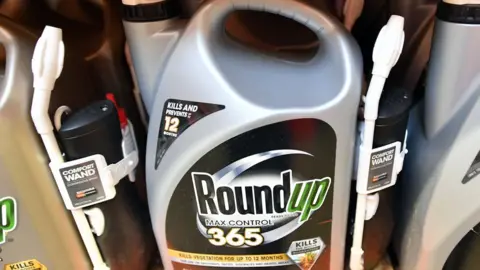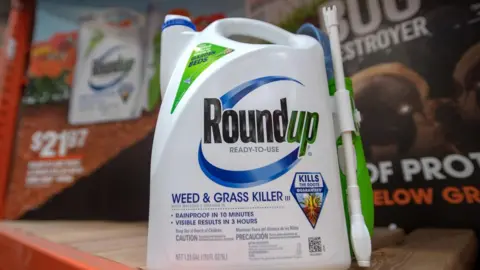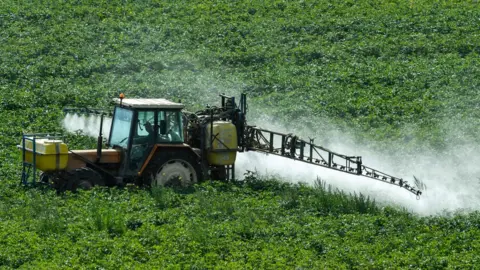Weedkiller cancer ruling: What do we know about glyphosate?
 AFP
AFPA US jury has found that chemical giant Monsanto knew its Roundup weedkillers were dangerous.
A man who claimed herbicides containing glyphosate had caused his cancer is to receive $289m (£226m) in damages from the company, although it has vowed to appeal.
It's the first lawsuit to go to trial alleging a glyphosate link to cancer - but what is known about the chemical?
What did the ruling say?
Jurors in San Francisco found that the company's weedkillers contributed "substantially" to the terminal illness of groundskeeper Dewayne Johnson.
Mr Johnson was diagnosed with non-Hodgkin's lymphoma in 2014. His lawyers said he regularly used a form of RangerPro while working at a school in Benicia, California.
The ruling said the potential risks of the product were known by the scientific community and Monsanto failed to "adequately warn" of the danger.
Jurors found that the company had acted with "malice" and that it should have provided a label warning of the potential health hazard of its product.
 AFP
AFPMr Johnson's lawyer, Brent Wisner, said the jury's verdict showed the evidence against the product was "overwhelming", adding that it was just "the tip of the spear" of future legal cases.
Monsanto vice president Scott Partridge said "the jury got it wrong" and the company would appeal the verdict to "vigorously defend this product".
He said Roundup had been safe for more than four decades and more than 800 scientific studies showed the herbicide does not cause cancer.
He added: "It is completely and totally safe and the public should not be concerned about this verdict."
What is glyphosate?
Glyphosate is the active ingredient in many weedkillers, although the science about its safety is still far from conclusive.
Introduced by Monsanto in 1974, its patent expired in 2000 and now the chemical is sold by various manufacturers.
It is used in agriculture and forestry, for weeds in industrial areas, as well as on lawns and gardens.
Some countries and regions - such as Portugal, Italy and the Canadian city of Vancouver - have banned glyphosate use in public parks and gardens.
Its effect on plants is non-selective, meaning it will kill most of them when applied. Some crops, such as soybean, have been genetically modified to resist glyphosate.
Farmers spray it on fields before their crops emerge in spring, so the crops do not have to compete with weeds.
Some also use it as a pre-harvest treatment to dry out crops and make them easier to harvest. The UK Soil Association says such use is risky, as it can increase glyphosate residues in food, such as bread.
How widely is it used?
It is described as the world's most popular weedkiller. In the US, more than 750 products contain it.
Glyphosate use worldwide has risen almost 15-fold since 1996, when so-called "Roundup Ready" crops, genetically engineered to resist glyphosate, were introduced.
Roundup is one of the UK's most popular weedkiller brands, while glyphosate herbicides are the most widely used herbicide in UK agriculture.
According to a 2017 study of Government data by Oxford Economics, 5.4 million acres of farmland across Britain are treated with glyphosate annually.
 AFP
AFPIn 2017 the European Union extended the licence for use of glyphosate for five years.
The UK was among the states in favour of glyphosate renewal. Germany and Poland were also among them - though they had previously abstained.
France and Belgium were among the states that voted against. Portugal abstained.
French President Emmanuel Macron is trying to ban it despite the resistance of some French lawmakers.
Sri Lanka banned use of glyphosate in 2015 - though the tea industry opposes the ban.
Colombia stopped aerial spraying of glyphosate in 2015 - even though it had been used widely to kill illegal coca plants.
What is the research?
In 2015 the International Agency for Research on Cancer, the World Health Organization's cancer agency, concluded that it was "probably carcinogenic to humans".
But the US Environmental Protection Agency (EPA) continues to insist that glyphosate is safe when used carefully.
In 2016, a joint report by the World Health Organiszation (WHO) and the UN said that, while there was "some evidence of a positive association between glyphosate exposure and risk of non-Hodgkin's lymphoma" in some studies, the only large study of high quality found "no evidence of an association at any exposure level".
It concluded that glyphosate "is unlikely to pose a carcinogenic risk to humans from exposure through the diet".
 AFP
AFPA 2016 study by Environmental Sciences Europe noted growing concern about intensive glyphosate use, because some plants have developed resistance to it - meaning that farmers tend to use even more of it.
Farmers warn that banning the chemical could cut crop yields by more than 10%, costing the economy hundreds of millions of pounds.
Should I be worried?
The European Commission says that the European Food Safety Authority, the European Chemicals Agency and other scientific bodies found no link to cancer in humans.
Emma Hockridge, head of policy at the Soil Association, said the "landmark" ruling in the US highlighted the problems caused by glyphosate.
She added: "It was disturbing in this case to hear that Monsanto had knowledge of the potentially harmful effects, but the court case also really highlights the problem with relying on chemical pesticides globally as so little is known about the long-term environmental and health impacts."
The UK Soil Association says glyphosate traces are regularly found in bread.
However, Joe Stanley, farming ambassador for the National Farmers' Union, said: "The decision of a lay jury in this poor chap's case doesn't alter the fact that all serious research proves glyphosate is safe."
Allow X content?

The UK government said in a statement: "The government's priority is the protection of people and the environment. Decisions on the use of pesticides should be based on a careful scientific assessment of the risks.
"Once outside the EU, we will continue to make decisions on pesticides based on the best available science."
